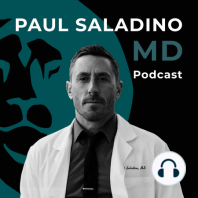81 min listen

106. Animal-Based vs Plant-Based, part 1.5. My response to Joel Fuhrman
106. Animal-Based vs Plant-Based, part 1.5. My response to Joel Fuhrman
ratings:
Length:
103 minutes
Released:
May 11, 2021
Format:
Podcast episode
Description
In our first podcast I asked Joel to provide any interventional studies showing harm from red meat, or any unprocessed meat. He was unable to provide these studies at that time, or in the 2 weeks that followed before I released our podcast debate. After that time he wrote a blog post with his thoughts in response to many of the points I raised during the podcast, providing what he believed to be studies corroborating his points. This podcast is a solo-cast in which I respond to his blog post points to show some counter points and point out that I still do not believe his case for plant-based diets is able to be substantiated. I’ve reached out to Joel to see if he will come back on the podcast for a part two, but he has not yet responded. Will keep you posted! #theremembering Time stamps: 0:10:07 Did Dr. Joel Furhman ever send me those studies that demonstrated red meat has a damaging affect on humans? 0:12:42 Reviewing Dr. Joel Fuhrman's blog post regarding plant foods vs animal foods 0:18:27 Association of animal and plant protein intake with all-cause and cause-specific mortality 0:23:17 Meat intake and cause-specific mortality: a pooled analysis of asian prospective cohort studies 0:24:27 Mortality in british vegetarians 0:28:07 Physical activity patterns and biomarkers of cardiovascular disease risk in hunter-gatherers 0:29:25 Increased lean red meat intake does not elevate markers of oxidative stress and inflammation in humans 0:29:47 Isocaloric diets high in animal or plant protein reduce liver fat and inflammation in individuals with type 2 diabetes 0:30:08 Effects of plant and animal high protein diets on immune-inflammatory biomarkers: a 6-week intervention trial 0:30:37 Changes in Dietary Fat Intake Alter Plasma Levels of Oxidized Low-Density Lipoprotein and Lipoprotein(a) 0:34:47 Cancer incidence in vegetarians: results from the European Prospective Investigation into Cancer and Nutrition (EPIC-Oxford) 0:37:14 Mortality in vegetarians and comparable nonvegetarians in the United Kingdom 0:38:47 Beef tallow increases apoptosis and decreases aberrant crypt foci formation relative to soybean oil in rat colon 0:41:12 Potential effects of reduced red meat compared with increased fiber intake on glucose metabolism and liver fat content: a randomized and controlled dietary intervention study 0:44:27 Validity of U.S. nutritional surveillance:National Health and Nutrition Examination Survey caloric energy intake data, 1971-2010 0:47:47 Effect of Legumes as Part of a Low Glycemic Index Diet on Glycemic Control and Cardiovascular Risk Factors in Type 2 Diabetes Mellitus - A Randomized Controlled Trial 0:50:37 Bean Consumption Is Associated with Greater Nutrient Intake, Reduced Systolic Blood Pressure, Lower Body Weight, and a Smaller Waist Circumference in Adults: Results from the National Health and Nutrition Examination Survey 1999-2002 0:57:52 The actions of exogenous leucine on mTOR signalling and amino acid transporters in human myotubes 1:01:37 Low Protein Intake Is Associated with a Major Reduction in IGF-1, Cancer, and Overall Mortality in the 65 and Younger but Not Older Population 1:05:27 Nutrition for the Japanese elderly 1:07:07 The capacity of foodstuffs to induce innate immune activation of human monocytes in vitro is dependent on food content of stimulants of Toll-like receptors 2 and 4 1:12:52 Fish oil attenuates omega-6 polyunsaturated fatty acid-induced dysbiosis and infectious colitis but impairs LPS dephosphorylation activity causing sepsis 1:16:07 Red meat and colon cancer: A review of mechanistic evidence for heme in the context of risk assessment methodology 1:19:32 Red meat enhances the colonic formation of the DNA adduct O6-carboxymethyl guanine: implications for colorectal cancer risk 1:24:07 Assessment of Causal Direction Between Gut Microbiota-Dependent Metabolites and Cardiometabolic Health: A Bidirectional Mendelian Randomization Analysis 1:25:27 Diabetes is Associated with Higher Trimethylamine N-
Released:
May 11, 2021
Format:
Podcast episode
Titles in the series (100)
Mark and Chris Bell: Why you should never give up on your dreams and how to be jacked and tan!: If you don't know who the Bell brother's are, you've probably been living under a rock! These are some pretty darn incredible dudes that no quick bio can do justice to but here’s my shot. Simply put, Mark Bell is basically super human. He calls... by Paul Saladino MD podcast